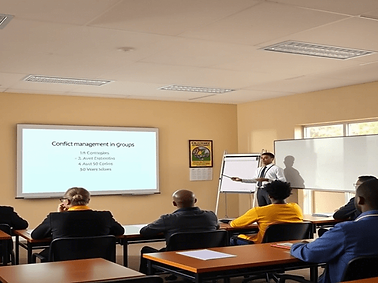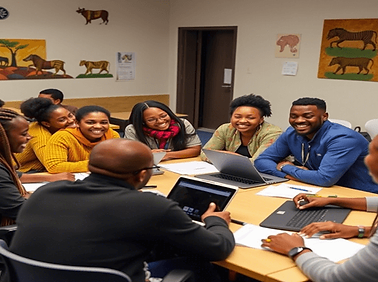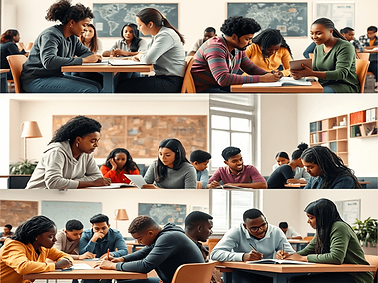
Made possible by:
Social Work Education post COVID-19 Course Redesign - Rediscovering new ways of learning and teaching in South Africa.

Redesigned Social Work Methods and Practice: Meso Practice 2025
Introduction
Professor Roshini Pillay redesigned the Social Work Methods and Practice: Meso Practice course to align with the principles of authentic learning. This shift aimed to create a more meaningful and engaging learning experience by grounding the course in real-world challenges and collaborative problem-solving. This section reports on areas where the principles of authentic e-learning were implemented.

01
Blended Learning for Flexibility and Engagement
The course combines face-to-face (21 hours) and online components (55 hours) to create a flexible yet structured learning environment. Meanwhile, the self-study and online tasks (30 hours) encourage independent learning, critical thinking and digital literacy. These aspects are very important to authentic e-learning.
02
Technology-Enhanced Learning (Authentic Digital Tools)
The course integrates Ulwazi (an online learning platform) for discussion posts, digital timelines, and reflection reports, ensuring students engage with digital tools they might encounter in professional settings. The course also incorporates technology-enhanced learning (TEL) through the Wits Ulwazi platform, where students engage in discussion forums and watch YouTube videos.


03
Authentic Skill-Building through Presentations
Continuous assessment tasks such as PowerPoint presentation that simulate professional reporting, weekly session reports, and discussion forum posts form a key part of the learning process and contribute 50% of the final mark. These tasks align closely with the principles of authentic e-learning by encouraging students to engage in meaningful, real-world activities that mirror the kinds of tasks they will encounter in professional settings.
An example of an activity used in this instance is students divided into small groups and given a composite case study based on real-world challenges in social work practice, such as working with out-of-school youth, teenage mothers, or older persons in residential care. Each group develops an intervention plan addressing group dynamics, needs assessment, facilitation techniques, and evaluation methods, while completing continuous assessment tasks that contribute to their final mark. These include weekly session reports where groups reflect on planning, decision-making, role allocation, and application of theory; discussion forum posts where students share insights and comment on peers’ approaches to encourage collaborative learning; and a professional PowerPoint presentation simulating a report-back session to an agency or funding body, covering the case overview, intervention goals, facilitation methods, anticipated challenges, strategies, and expected outcomes.
04
Collaboration
This course is designed to create a collaborative and interactive learning environment, where the knowledge and experiences are valued and built upon. Students are actively involved in the learning process through Participatory Action Research (PAR), the Wits Ulwazi Learning Management System and face-to-face interactions both in the classroom and online. The course works in synergy with field instruction, allowing students to connect theory with practice in meaningful ways. Collaboration is of great importance in preparing Social Work students for the work environment where collaboration is of great importance.


05
Peers as experts
There is recognition that each student brings unique experiences and insights to the class, and the lecturer draws on these to enhance learning together. The teaching and learning approach includes a mix of lectures, class discussions, synchronous and asynchronous online forums, and presentations. As an illustration, students actively rely on each other’s expertise throughout the stages of group formation. During the forming stage, for example, students share their prior experiences with social work settings or community projects, helping the group understand each member’s perspective and strengths. In the storming stage, when conflicts or differing viewpoints arise, students draw on each other’s knowledge of group dynamics or ethical decision-making to negotiate solutions, fostering critical reflection and problem-solving skills. During the norming stage, roles emerge naturally based on individual expertise, some students may lead research, others may facilitate discussion, and some may focus on organising resources, allowing the group to function efficiently while respecting each member’s contributions. In the performing stage, students collaborate on tasks such as analyzing case studies, designing intervention plans, or presenting solutions to complex social issues, explicitly leveraging each member’s skills and insights. Throughout these stages, the teaching approach; blending lectures, discussions, synchronous and asynchronous forums, and presentation reinforce the value of each student’s unique experiences and knowledge thus creating a learning environment where peer-to-peer learning is central and the lecturer acts as a facilitator rather than a sole authority.
06
Authentic Assessment
Ongoing assessment in this course is designed to support authentic e-learning by integrating real-world tasks, collaborative responsibilities, and reflective engagement. Students participate in online discussion forums on Ulwazi as part of the group assignment, which encourages critical thinking, dialogue, and the application of theoretical knowledge to practical scenarios. In addition, class role-plays allow students to simulate professional social work situations. The group assignment further strengthens authenticity by requiring students to engage in genuine collaborative processes. Group members allocate tasks among themselves, and each member signs to acknowledge receipt and understanding of their responsibilities. This mirrors professional accountability and task management in real-world social work settings. The inclusion of a task schedule in the final submission, along with weekly progress reports, provides transparency and encourages reflective monitoring of both individual and group contributions. Importantly, each student is allocated at least one individual task within the group project, which counts for 50% of their final mark, ensuring that every member’s contribution is both meaningful and assessed fairly. A class test towards the end of the course ensures individual comprehension while reinforcing the connection between knowledge acquisition and applied practice.


07
Reflections
When completing the assignment students are required to make use of relevant theory and reflections on the “small group experience in class and out-side” to assess the group functioning based on the following aspects:
-
The social condition the group was set up around.
-
The group dynamics and collaboration of members in class.
-
The behavior of functional and dysfunctional members without using names.
-
The manner in which conflict was managed.
-
The use of activities and icebreakers.
-
The use of reflective diary entries.
-
The use of on-line group discussions.
-
The challenges and successes experienced.
-
The recommendations and learning for future students taking this course.
The analysis of students’ experiences in both in-class and online small group activities fosters reflective practice, allowing them to critically examine their own contributions, interactions, and learning processes. This is an essential skill for effective professional practice in the workplace.
08
Problem solving skills
In terms of skills the course aims to develop and extend the student’s understanding in order to:
-
Plan and start a promotive or preventative group.
-
Assess both individual and group functioning.
-
Assess self as a group member
-
Assess self as a group leader
-
Facilitate the identification of individual and group goals.
-
Develop skills on the recruitment of group members
-
Apply skills needed to contract with group members
-
Plan and execute group activities based on the nature and stage of the group
-
Work collaboratively and cooperatively in members in the course group
-
Ability to write coherent, logical, grammatically correct and well considered reports/memos/discussion forum posts whether for internal or external use
-
Recognise humans as bio-psycho-social (BPS) beings, as the biological, psychological and social (including the spiritual) dimensions of life are inter-connected and mutually reinforcing.
The skills provide students with both the theoretical understanding and practical tools needed to navigate complex group dynamics. By learning to plan and initiate promotive or preventative groups, assess individual and group functioning, and reflect on their roles as both group members and leaders, students gain the ability to identify challenges and respond appropriately. Facilitating the setting of individual and group goals, recruiting and contracting with members, and planning activities according to the group’s stage requires critical thinking, adaptability, and collaborative problem-solving. Moreover, working cooperatively within their course group and communicating effectively through reports, memos, and discussion forum posts strengthens analytical and decision-making skills. Furthermore, understanding humans as bio-psycho-social beings equips students to approach issues holistically, considering interconnected biological, psychological, social, and spiritual factors, which enhances their capacity to devise thoughtful, context-sensitive solutions to real-world challenges in social work practice.

Conclusion
In conclusion, the Social Work Methods and Practice: Meso Practice course is designed to align with the core principles of authentic learning. This is achieved through a blended learning approach that promotes flexibility and sustained engagement, the integration of technology-enhanced learning, and the development of real-world skills through presentations, collaborative tasks, and reflective practice. Moreover, the incorporation of authentic assessment, problem-solving opportunities and exposure to expert performance enables the course to create a learning environment that prepares students for the complexities and demands of professional social work practice.
If you want to learn more, you can download our PDF:
Some Authentic Activities in the Redesigned Social Work Methods and Practice Module